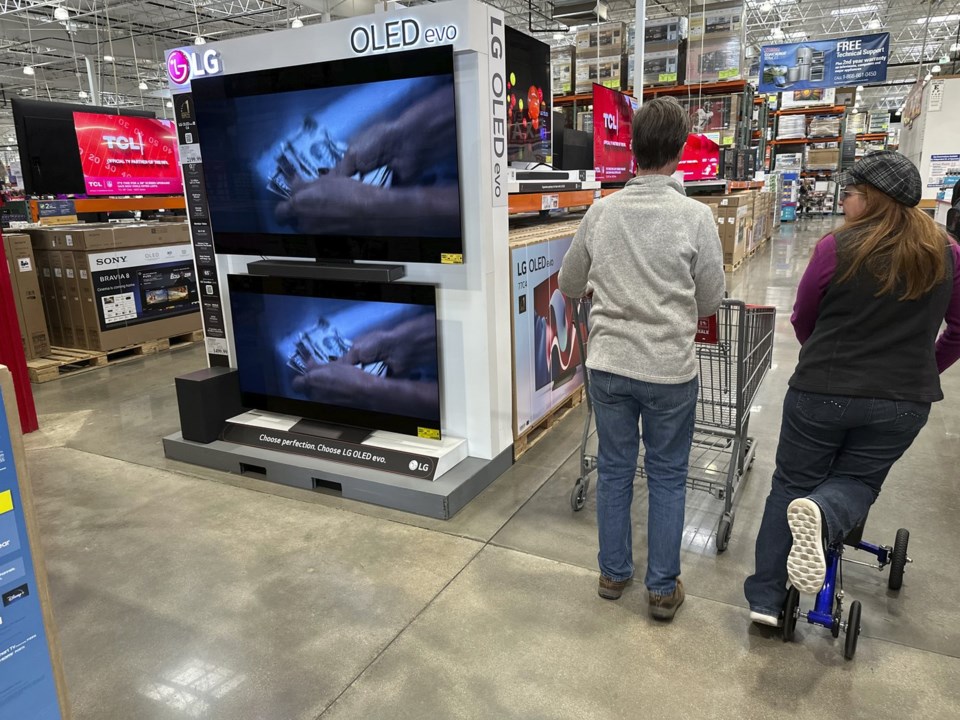WASHINGTON (AP) — Americans’ views of the economy improved in May after five straight months of declines sent consumer confidence to its lowest level since the onset of the COVID-19 pandemic, largely driven by anxiety over the impact of President Donald Trump’s tariffs.
The Conference Board said Tuesday that its consumer confidence index rose 12.3 points in May to 98, up from April’s 85.7, its lowest reading since May 2020.
A measure of Americans’ short-term expectations for their income, business conditions and the job market jumped 17.4 points to 72.8, but remained below 80, which can signal a recession ahead.
The proportion of consumers surveyed saying they think a U.S. recession is coming in the next 12 months also declined from April.
Trump’s aggressive and unpredictable policies — including massive import taxes — have clouded the outlook for the economy and the job market, raising fears that the American economy is headed toward a recession.
However, Trump's tariff pullbacks, pauses and negotiations with some trading partners may have calmed nerves for the time being.
"The rebound was already visible before the May 12 US-China trade deal but gained momentum afterwards,” said Stephanie Guichard, senior economist at The Conference Board.
Trump had initially imposed a stunning 145% tariff on most goods from China, but agreed to a 90-day pause for negotiations. The U.S. also came to an agreement with the U.K. earlier in May.
Over the Memorial Day holiday weekend, Trump and European Union leaders announced that the president's 50% tariff on imports from the E.U., which he announced Friday, are on hold until July 9. That announcement would not have impacted the Board's survey, which closed on May 19.
The Conference Board said the rebound in confidence this month was broad-based across all ages and income groups.
Consumers’ assessments of the present economic situation also improved, with the exception of their view on job availability, which weakened for the fifth straight month despite another strong U.S. jobs report.
However, less than 25% of respondents said they were worried about losing their jobs, compared with the 50% of respondents who said they were concerned about not being able to buy the things they need or want.
The Labor Department earlier this month reported that U.S. employers added a surprising 177,000 jobs in April and the unemployment rate remained at a low 4.2%.
Write-in responses to the survey showed that tariffs are still consumers’ biggest concern. Inflation is also still weighing on their minds, though some noted that inflation seemed to be easing, along with gas prices.
Earlier in May, the Commerce Department reported that consumer prices rose just 2.3% in March from a year earlier, down from 2.7% in February. Excluding the volatile food and energy categories, core prices rose 2.6% compared with a year ago, below February’s 3%. Economists track core prices because they typically provide a better read on where inflation is headed.
Gas prices have hovered around $3.17 per gallon this month, down from $3.59 a year ago, but up a few pennies from April.
The slowdown in inflation could be a temporary respite until the widespread duties imposed by Trump begin to push up prices in many categories. Most economists expect inflation to start ticking up in the coming months.
Robert Frick, an economist with Navy Federal Credit Union, said that while the tariff rollbacks may have boosted Americans' confidence this month, that optimism may be fleeting.
“When prices start rising from existing tariffs in a month or two, it will be a sobering reminder that a new inflation fight has just begun,” Frick said.
The Board's survey Tuesday also showed that Americans' plans to spend on homes, cars and vacations also increased from April, with significant gains coming after the May 12 China tariff pause.
Matt Ott, The Associated Press



